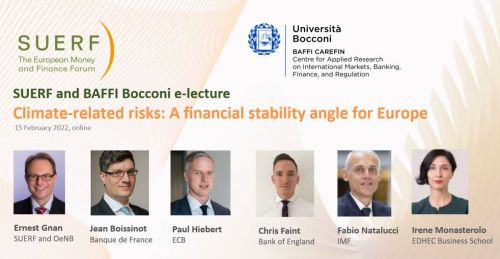
Irene Monasterolo invited to discuss climate-related risks
On 15 February 2022, over 160 global experts met online for a SUERF-BAFFI Bocconi e-lecture to discuss “Climate-related risks: a financial stability angle for Europe”. Speakers came from the European Central Bank, the Banque de France, the Bank of England, the International Monetary Fund and EDHEC.
Written on 18 Feb 2022.

On February 15, Irene Monasterolo, Professor of Climate Finance at EDHEC-Risk Institute, EDHEC Business School has been invited by SUERF, the European Money and Finance Forum, to participate in a debate to discuss climate risks and financial stability for Europe.
Climate change and transition pose important challenges for many firms, for entire economic sectors, and for our economies as a whole. Clearly, there is an urgent need for risk quantification to underpin action in the public and private sectors. This is crucial to ensure adequate pricing of assets early on to avoid climate change or transition induced financial disruption, and to inform policymakers of the optimal path to choose for climate transition. The ESRB and ECB, and indeed central banks and financial regulators and supervisors worldwide have therefore mobilized their resources to improve the measurement and modeling of climate related risk for banks, but also other segments of the financial sector.
The aim of this workshop was twofold. First, to get an overview of work underway in European central banks and globally. Second, to learn where challenges and open issues wait to be tackled and solved.
Jean Boissinot, Head of Secretariat, Network for Greening the Financial System (NGFS), Banque de France and Paul Hiebert, Head of Systemic Risk & Financial Institutions Division, European Central Bank, shared with the audience the Euro systems and the NGFS current thinking on financial stability risks from climate change and the energy transition as published in ESRP Reports of 2020 and 2021 and as currently under preparation for the ESRB Report of 2022. Three top experts complemented this presentation with their own perspectives. Chris Faint, Head of the Climate Hub Division at the Bank of England, started out with comments and the bank of England's view. After some first reactions by Jean and Paul, Fabio Natalucci, Deputy Director of the Monetary and Capital Markets Department at the International Monetary Fund (IMF), followed up with a global IMF perspective after another round of reactions by Jean and Paul. Finally, Professor Irene Monasterolo from EDHEC Business School offered her perspectives from many years of research on climate finance issues.
Irene started with comments on the presentation made by Jean and Paul: what the presentation does and why it matters? It provided a very interesting overview of the latest development of green finance and financial analysis of climate financial risk exposure of financial actors as well as some very interesting results of the ECB's climate stress test.
Main take home messages are relevant in both the light of policy making and research which is ongoing on the topic:
- Heterogeneous green finance path by type of financial contracts. We saw the difference between green loans, bonds and ESG plus risk of greenwashing;
- Heterogeneous exposure of banks to physical risk by country; and in this regard the importance of data, scenarios and disaster risk assessment could affect results;
- The importance of transition risk which is not just across but also within sectors as Paul has extensively elaborated on;
- Short term cost of climate transition policies are pale in comparison to the cost of unfettered climate change in the medium to long term.
The result of the analysis that's been presented today all point to the fact that risk assessment is crucial for capital allocation from high to low carbon investments, which is in turn fundamental to achieve the climate mitigation and also adaptation targets. So in this regard, climate financial risk assessment plays a major role, says Professor Monasterolo
Amongst other important topics, Irene focused on the role of scenarios for climate stress test. Current scenarios that we use for climate stress test don't consider the role of finance and what we call the investors "climate sentiments"; so investors looking at the scenarios and deciding or not to adjust the risk assessment and for instance, the cost of capital. What she recently analyzed in a paper published in Science is that when they account for the role of finance and investors expectations, the trajectories that they obtain for orderly and disorderly transitions could differ greatly. And this has very important implications for decision makers being both in finance but also investors. And last but not least, when we talk about scenarios, we should consider to include a broad range of scenarios in our climate stress test exercises because recent research showed that risk metrics such as probability of default or expected shortfall are highly sensitive to the probability of occurrence of disorderly scenarios. So including a broad range of scenarios is not only consistent with the practice of the stress test, but also would allow us under these conditions to avoid underestimating risk.
Implement climate financial risk exposure and climate stress test is crucial to inform decision making (investors, fianncial supervisors, etc); and European financial supervisors really moved fast to meet this new challenge. We should be aware of that there are several issues at stake and in order to address them we need to embrace the methodological challenges in order to avoid underestimation of risks and opportunities in the transition. And the issues we will need to face in the very last months are the issues with data, with metrics of exposure, the use of scenarios for climate stress tests, the use of macroeconomic models and financial valuation model, concluded Irene Monasterolo.

Access the replay of the e-lecture
Further information on the conference can be found on the SUERF website.

